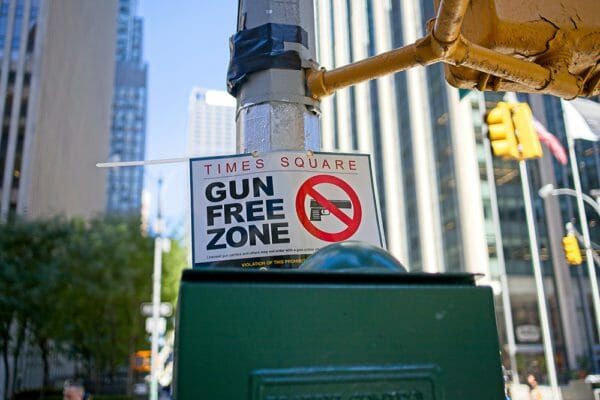
The Gun Owners of America (GOA) case, Antonyuk v. Hochul, against New York’s Concealed Carry Improvement Act (CCIA) has been waiting on a ruling from the Second Circuit Court of Appeals to whether the District Court’s issued injunction will stand. The court’s opinion is in, and the injunction will stand in part, but overruled in other areas.
The order reads: “In summary, we uphold the district court’s injunctions with respect to N.Y. Penal L. § 400.00(1)(o)(iv) (social media disclosure); N.Y. Penal L. § 265.01-d (restricted locations) as applied to private property held open to the general public; and N.Y. Penal L. § 265.01-e(2)(c) as applied to Pastor Spencer, the Tabernacle Family Church, its members, or their agents and licensees. We vacate the injunctions in all other respects, having concluded either that the district court lacked jurisdiction or that the challenged laws do not violate the Constitution on their face.”
The case involves a challenge to New York’s CCIA by New York resident and Ukrainian immigrant Ivan Antonyuk. After the landmark Supreme Court decision in New York Pistol Rifle Association v. Bruen. New York called an emergency session to pass new concealed carry laws since the state could no longer be a “may issue state.”
Provisions in the CCIA included making most of the state a “sensitive area.” In Bruen, SCOTUS said certain places could be designated “sensitive areas,” such as schools and government buildings, but the designation had to be used sparingly. For example, just because people gather in a location isn’t enough to designate that place as “sensitive.”
New York would thumb its nose at SCOTUS and make most of the state a “sensitive area.” Time Square would be designated sensitive because people gather there even though the Supreme Court explicitly forbade states from using those criteria. Also, anywhere that counseling is offered would be a “sensitive area,” even if it was offered in a private residence.
Churches and church grounds were also designated sensitive. If a church pastor lived on church property, that religious leader was not allowed to keep a gun in their home. The law disarmed many New Yorkers that would be out of their homes.
The law also added “restrictive places.” All private property in the Empire State became “gun-free zones” for law-abiding citizens unless the owner of the private property posted signs welcoming firearms. This change means that gun owners going to the gas station or grocery store run a high probability of breaking New York law.
The lawsuit also challenged the new requirements to get a concealed carry permit. The applicant had to submit three years of social media posts, give character references, take extensive training, and be of “good moral character.”
The social media requirement has a chilling effect on freedom of speech. New York claims it is to prevent extremists from carrying firearms, but what constitutes an extremist is subjective. The state gets to decide what ideas will make you ineligible for a concealed carry permit, even if those ideas are protected speech.
Many view the “good moral character” clause as a replacement for the “good cause” of the concealed carry law that was struck down in Bruen. The requirement is subjective, allowing the issuing agency a wide latitude to reject an application.
Gun rights activists also view the training requirements as particularly burdensome. The amount of training needed costs a vast amount of money, meaning people in lower income brackets cannot afford the classes. Most of the time, these people live in areas with high rates of crime, meaning they are the ones who need firearms to defend themselves.
The court knocked down the restrictive places clause for places open to the public, such as gas stations and stores. The injunction doesn’t extend to private homes, but it does mean a concealed carrier can now go to public areas without worry of being arrested.
The injunction extends to social media. New Yorkers applying for a concealed carry permit no longer must submit three years of social media. This clause in the law was of big concern not only to Second Amendment advocates but also to First Amendment advocates.
The named plaintiff in the case, Pastor Spencer, and the congregation of the Tabernacle Family Church will be allowed to carry firearms, but the injunction doesn’t extend past that exception.
The Court’s decision is expected to be appealed by either the plaintiffs or the defendants. New York will most likely ask for an en banc hearing. The plaintiff’s best bet is to go directly to SCOTUS.
About John Crump
John is a NRA instructor and a constitutional activist. He has written about firearms, interviewed people of all walks of life, and on the Constitution. Mr. Crump lives in Northern Virginia with his wife and sons and can be followed on Twitter at @crumpyss, or at www.crumpy.com.

from https://ift.tt/FjIGMvK
via IFTTT

No comments:
Post a Comment